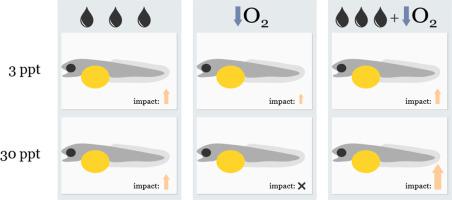Comparative Biochemistry and Physiology D: Genomics & Proteomics ( IF 3 ) Pub Date : 2020-11-17 , DOI: 10.1016/j.cbd.2020.100753 Maria L Rodgers 1 , Jennifer Serafin 2 , Maria S Sepúlveda 2 , Robert J Griffitt 1

|
Understanding the effects of oil exposure on early life stage fish species is critical to fully assessing the environmental impacts of oil spills. Oil released from the 2010 Deepwater Horizon spill reached habitats where estuarine fish routinely spawn. In addition, estuaries are highly dynamic environments, therefore, fish in these areas are routinely exposed to varying salinity and dissolved oxygen (DO) levels, each of which are known to modulate transcriptional responses. Fish exposed to oil often display altered immune competence, and several studies have shown that Deepwater Horizon oil in particular causes modulation of various immune functions. However, few studies have directly examined how environmental parameters may affect oil-induced immunomodulation, particularly in early life stage fishes when the immune system is still developing. To this end, we examined transcriptional patterns of immune genes and pathways in Fundulus grandis larvae to various oil (0, 15 μg/L), salinity (3, 30 ppt), and DO (2.5, 6 mg/L) regimes in a fully factorial design. Our results suggest that immune pathways are generally activated in all treatment groups with the exception of the Low Salinity/No Oil/Hypoxia treatment where immune pathways are largely suppressed, and the High Salinity/No Oil/Hypoxia treatment where pathways are unchanged. The High Salinity/Oil/Hypoxia treatment had the largest number of enriched immune pathways (44 as defined by IPA and 43 as defined by ConsensusPathDB), indicating that oil under certain environmental conditions has the potential to further modulate immune-related genes, pathways, and responses in fish.
中文翻译:

盐度和溶解氧状态对生命早期阶段大眼底油的转录组免疫反应的影响
了解石油暴露对生命早期鱼类物种的影响对于全面评估石油泄漏对环境的影响至关重要。2010 年深水地平线泄漏事件释放的石油到达了河口鱼类经常产卵的栖息地。此外,河口是高度动态的环境,因此,这些地区的鱼类经常暴露于不同的盐度和溶解氧 (DO) 水平,已知每一种都会调节转录反应。暴露在油中的鱼通常表现出免疫能力的改变,几项研究表明深水地平线油尤其会引起各种免疫功能的调节。然而,很少有研究直接研究环境参数如何影响油诱导的免疫调节,尤其是在免疫系统仍在发育的早期鱼类中。为此,我们研究了免疫基因和途径的转录模式在Fundulus茅在全因子设计中,幼虫对各种油 (0, 15 μg/L)、盐度 (3, 30 ppt) 和 DO (2.5, 6 mg/L) 方案的影响。我们的结果表明,除低盐度/无油/缺氧处理(其中免疫途径在很大程度上受到抑制)和高盐度/无油/缺氧处理(其中途径未发生变化)外,所有处理组中的免疫途径通常都被激活。高盐度/油/缺氧处理具有最多数量的富集免疫通路(IPA 定义的 44 条和 ConsensusPathDB 定义的 43 条),表明在某些环境条件下,油具有进一步调节免疫相关基因、通路、和鱼的反应。


























 京公网安备 11010802027423号
京公网安备 11010802027423号